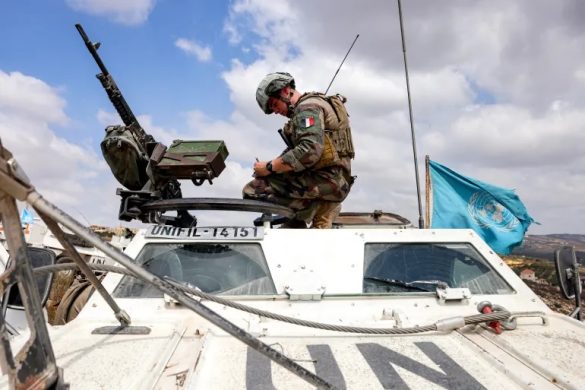The United Nations Interim Force in Lebanon (UNIFIL) has accused Israeli drones of dropping four grenades near peacekeepers on Tuesday morning close to the southern border with Israel.
In a statement released Wednesday, UNIFIL described the incident as “one of the most serious attacks on UNIFIL personnel and assets since the cessation of hostilities agreement of last November.”
According to the statement, one grenade landed within 20 metres of peacekeepers and their vehicles, while three others fell within approximately 100 metres. The peacekeepers had been working to clear roadblocks that were obstructing access to a UN position.
UNIFIL stressed that the Israeli army had been informed in advance about the clearance operation southeast of the Lebanese village of Marwahin. “Any actions endangering UN peacekeepers and assets, and interference with their mandated tasks, are unacceptable and a serious violation of Resolution 1701 and international law,” the UN force said, referring to the resolution that ended the 2006 Israel-Hezbollah war.
Tensions Along the Border
Since the November 2024 ceasefire with Hezbollah, Israel has continued near-daily operations in Lebanon, saying it is targeting Hezbollah positions and personnel. However, those strikes have also resulted in civilian casualties, the destruction of homes and infrastructure, and the displacement of thousands of residents.
Al Jazeera’s Zeina Khodr, reporting from Beirut, noted that peacekeepers believe the attack was deliberate. “The Israeli army knew UN peacekeepers would be carrying out work to remove rubble, and that’s why they are calling this a deliberate targeting. This is being seen as a message that Israel will not allow access to areas close to the border,” she said.
Khodr added that Israel has established new positions along the border inside Lebanese territory, effectively creating a buffer zone. Many displaced families have not been able to return to their villages to rebuild or even clear debris, as Israeli drones often target bulldozers, she reported.
UNIFIL’s Future
UNIFIL, established in 1978, has patrolled Lebanon’s southern border for decades. Last week, the UN Security Council unanimously extended the mission until the end of 2026, after which a one-year phased withdrawal will begin. The decision comes amid strong pressure from Israel and the United States, who argue the force has failed to disarm Hezbollah and provides the group with political cover.
Meanwhile, Israel continues to occupy at least five positions in southern Lebanon despite the November ceasefire agreement, which required its full withdrawal.
Hezbollah’s Position
Hezbollah Secretary-General Naim Qassem has rejected calls for the group to disarm, insisting that Lebanon’s sovereignty depends on resisting Israeli presence. He has argued that any national defence strategy discussions must wait until Israel complies fully with the ceasefire, withdraws from Lebanese territory, releases prisoners, and halts its operations.
“The resistance will remain a strong barrier preventing Israel from achieving its goals,” Qassem said last month, dismissing suggestions that Hezbollah’s weapons could be integrated into the Lebanese army before those conditions are met.


